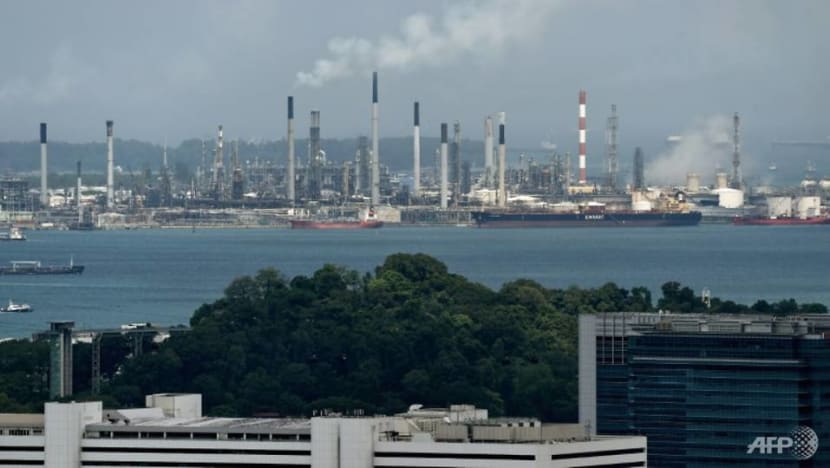Emitters working on improving energy efficiency to deal with looming carbon tax hikes

SINGAPORE: To deal with newly-announced carbon tax hikes that will take effect over the coming years, large emitters say they will continue improving energy efficiency, among other initiatives, to cut their emissions.
Singapore’s carbon tax rate will go up from the current S$5 per tonne of emissions to between S$50 and S$80 by 2030, amid more ambitious climate goals announced as part of Budget 2022 on Friday (Feb 18).
Rates will first be raised to S$25 per tonne of emissions in 2024, and again to S$45 per tonne in 2026. The tax is currently applied to facilities that directly emit at least 25,000 tCO2e of greenhouse gas (GHG) emissions per year.
DBS’ Senior Economist Irvin Seah said this will create a “significant impact” on the economy, especially for the power generation, manufacturing, aviation and land transport sectors. This may in turn be passed on to consumers as higher prices, he said.
One such large emitter that CNA spoke to, power generator and electricity retailer PacificLight, said the increases will certainly have “a direct impact” on operation costs.
But it will deal with this by optimising the efficiency of its generating equipment, said CEO Yu Tat Ming.
Mr Yu said that the firm has invested more than S$5 million in improving plant efficiency since 2013, which has helped cut its emissions by 1.5 per cent.
It will also upgrade its plant next year with “the region’s first ever Advanced Turbine Efficiency Package (ATP)”. This will bring total carbon reduction to 40,000 tonnes per annum – equivalent to supplying carbon-free electricity to more than 20,000 Singapore households, he said.
In addition, PacificLight has received an in-principle license for a pilot solar import project from Indonesia to Singapore, which will reduce carbon emissions by more than 357,000 tonnes per annum, said Mr Yu.
As part of the Budget announcement on Friday, firms will also be allowed to use “high-quality” international carbon credits to offset up to 5 per cent of their taxable emissions from 2024.
Mr Yu said PacificLight, which has been trading carbon credits since 2014, will likely make use of these offsets to optimise costs.
SUPPORTING AN “EXPLICIT PRICE” ON CARBON
Oil company ExxonMobil told CNA it supports an “explicit price on carbon to establish market incentives” and provide the clarity needed for investments.
It has even set its own goal of reaching net-zero emissions from its operated assets by 2050, a company spokesman said.
“We are taking a comprehensive approach to develop detailed emission-reduction roadmaps for our major operated assets including our integrated manufacturing complex in Singapore.”
But given that Singapore has an export-oriented economy, it also noted the importance of ensuring that the carbon tax framework “safeguards competitiveness of trade-exposed industries”.
As for oil company Shell, the firm “has always been supportive of putting a direct price on carbon emissions” as part of a broader framework for net-zero emissions, a spokesperson told CNA.
It also welcomed the news that authorities will be using a large part of the carbon tax revenue to support companies to invest in low-carbon technologies.
“This is critical as near-term competitiveness impact is real,” it said.
It noted that Singapore exports most of its energy and chemical products, and has to compete with other countries that do not have a carbon price policy, or have “sophisticated mechanisms” to help their trade-exposed industries remain competitive, if they do.
Shell added that it is in the process of transforming its business, moving away from traditional fuel production and instead embarking on businesses such as in circular chemical production.
ISSUE OF COMPETITIVENESS
Ms Melissa Low, a research fellow at the National University of Singapore’s Energy Studies Institute described the carbon tax hikes as “aggressive”.
On the issue of whether this will dampen Singapore’s competitiveness, Ms Low said it depends on what other countries will do in the coming years.
“If other countries (adopt similar policies, and carbon prices) are rising at an accelerated rate as well, then everyone is on par with one another, and our goods and services might not be so expensive to the point where it becomes uncompetitive.”
She added that having an ultimate range of S$50 to S$80 per tonne of emissions by 2030 is strategic, as it will “build in flexibility” for Singapore, depending on how the future plays out.
“A STEP IN THE RIGHT DIRECTION”
Green advocates have welcomed the moves, calling them “a step in the right direction”.
SG Climate Rally said the carbon tax is a “signal of our country’s priorities in making sure polluters pay their fair share”.
On behalf of SG Youth for Climate Action (SYCA), youth delegate Swati Mandloi also noted that the new rates will move Singapore closer to the prices recommended by bodies such as the International Energy Agency and the World Bank by the end of the decade.
But they also pointed out room for improvement.
For instance, while Singapore has brought forward its net-zero target to by or around mid-century, it has not set an exact date, said Ms Swati. Doing so, she added, is important as it will “send a stronger message and enable a net-zero transition in line with the latest science”.
SG Climate Rally echoed hopes that the Government will “commit fully to the 2050 date”. It also called on authorities to “enshrine this target by law”.
Both green groups also raised concerns about the use of international carbon credits as offsets.
While SYCA welcomed the move, it said it is “cautious” about this given that some carbon markets in the past have not delivered on their promises.
“With the sector-based allowances and use of carbon offsets, it will be important that regulators are transparent and introduce healthy checks and balances to meaningfully deliver climate action.”
SG Climate Rally added: “Given the prevalent issues surrounding the verifiability and integrity of the global carbon offsets market, proper scrutiny is needed to ensure that offsets don't give polluters the opportunity to evade their climate obligations.”
TIME TO RE-ASSESS
Announcing the roadmap for the tax increases early will give companies time to plan ahead and “make the necessary investments” to become greener, said Deloitte Southeast Asia’s Tax & Legal Climate & Sustainability Leader, Wong Meng Yew.
Firms should also see the journey to decarbonisation not just as “a matter of compliance”, but as a “timely opportunity” to adopt robust sustainability strategies for the long-term, said Schneider Electric’s cluster president for Singapore, Malaysia and Brunei, Yoon Young Kim.
“Ultimately, the move to impose higher carbon tax will urge more companies to … step up their pace in making a low-carbon transition as they increasingly recognise the costs of inaction and the value of limiting emissions.”
















